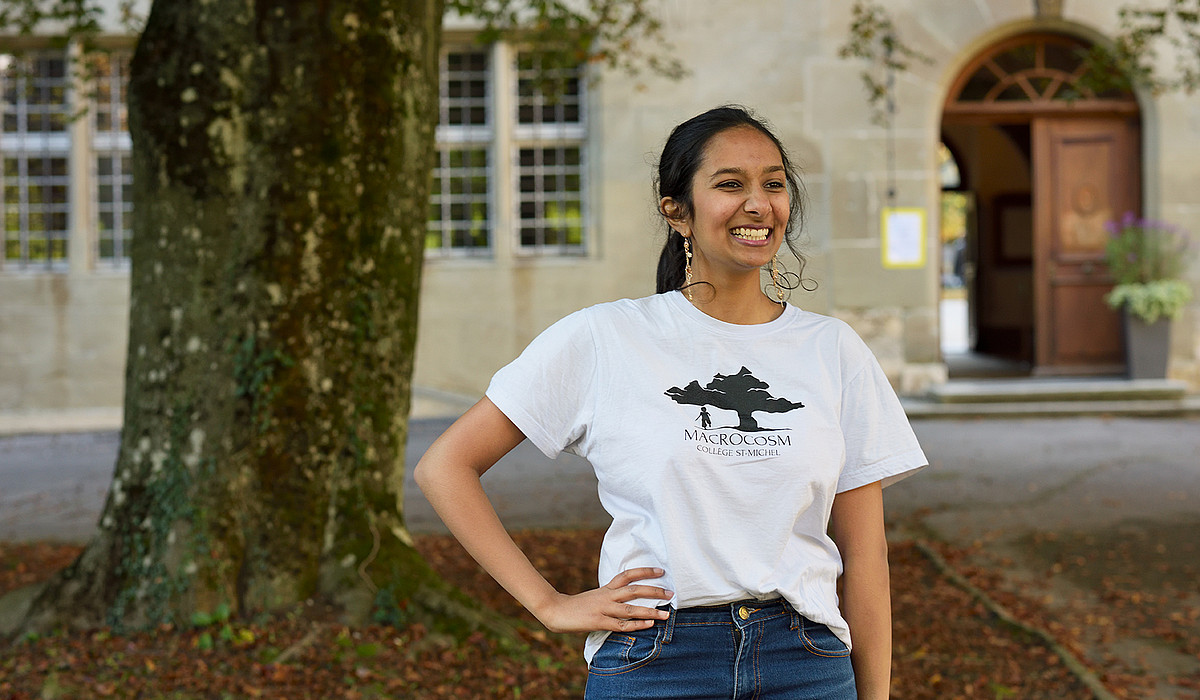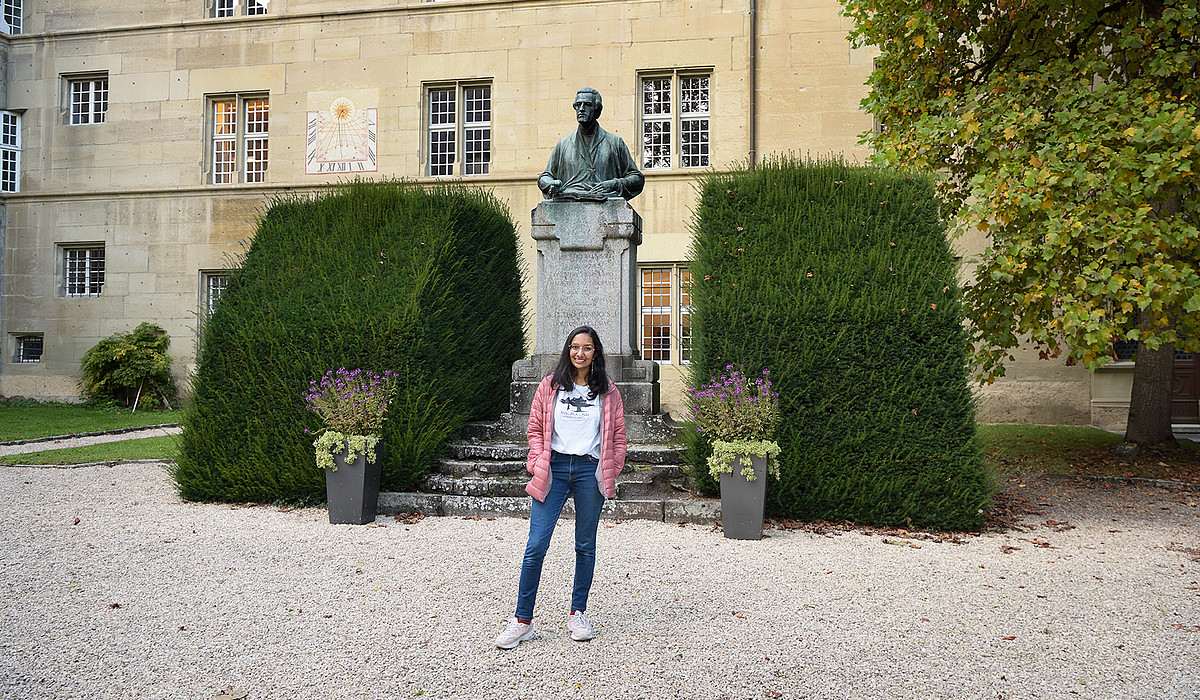Robotics
Diese Schweizer Kids bauen die weltbesten Lego-Roboter
Blick besucht die Schweizer Robotik-Weltmeister Mael und Quirin im Hobbyraum.
16.11.2020

"Volunteering is work, but it’s worth it", Nitya says. (All images: Claudia Christen).

The inner courtyard of Collège St. Michel is Nitya's favourite spot at school. (All images: Claudia Christen).
There are likely some people who take part in the climate strike just to get a day out of school and then behave in ways that are harmful for the environment. This is a problem, since it brings a hypocritical attitude to a very serious issue; climate change itself is not “just a trend”. I went trekking on the Aletsch glacier recently and it is receding at a rate of 20 metres per year. People have to understand that this is real, and it is man-made. There is a global change of attitude in this direction, and if that makes people actually change their behaviour, that is a trend, but a positive one! To see a movement gaining traction is a huge motivation. If I tried to do what I do 40 years ago, it would have been much harder, because fewer people took climate change seriously.
Volunteering is work, but it’s worth it.
Macrocosm was founded by a teacher at Collège St. Michel in 1985. It started out as a fundraising organisation and to this day, this is our primary purpose. We work together with other organizations, raising funds for them. Our aim is to help on three levels. First, on the school level; we want to reduce waste, electricity consumption and CO2 emissions in our school. The second level is local. We fundraise for different NGO’s in Fribourg, and sometimes we also clean up garbage in the city. Once, we worked together with an organisation called Fribourg solidaire to create a public presentation on the United Nations’ Sustainable Development Goals. The third level is international; we raise funds for associations outside of Switzerland. The last association we worked with is called Emaua and helps people in Kenya to gain a livelihood by planting trees.
Nitya Rajan is 18 years old and is currently in her final year at Collège St. Michel in Fribourg. She joined the environmentalist and humanitarian association Macrocosm in her first year at Collège. Over a year ago, she became co-president. Nitya has participated in the Philosophy and Biology Olympiads. After school, she plans to study medicine.
My grades are important to me and I aspire to do well. So when my grades in the languages became worse, I went through a bit of a crisis and I had to make a decision: Should I really run for president of Macrocosm? Which commitment should I drop? Should I drop anything? It’s a dilemma – you don’t want to choose, but you have to. In the end I left the choir. Sometimes, you have to pay a price in order to keep the balance. Although I don’t regret anything. For example, I met so many new people in the Olympiads and it will stay with me forever, so I am glad I participated.
<iframe allowfullscreen frameborder="0" height="315" src="https://www.youtube.com/embed/AasZ9Doqx-Y" width="560"></iframe>
In the video, Nitya talks about her most important experience while volunteering.
Definitely! People underestimate administrative work. Organisation, coordination, these are things we often take for granted. I learned how to write proper emails and letters in formal French and German, how to communicate with third parties – it’s not as obvious as it sounds! The time management skills I learned will also be an asset. The second you have multiple things on your hands, you have to learn to prioritise. Additionally, when the Covid-19 crisis hit, morale among the members of Macrocosm was low and I learned how to encourage people. These are all practical skills I’m certain I will keep for life. They say that charity is actually one of the most selfish acts, and they’re not wrong, because it’s incredibly gratifying when you see what you were able to achieve. Volunteering is work, but it’s worth it. It’s a privilege which everyone should have a chance to experience.
According to a recent survey by Fachhochschule St. Gallen, 94% of adolescents think volunteering is important. Most youths are interested in volunteering work in sports (56%), culture and leisure (47%) as well as education (44%). However, the steepest increase has been noted in activities relating to environmental protection (+19 %).
My parents inspire me. Sometimes when I share my ideas and opinions with them, they bring in perspectives I had not even considered. Me having grown up in Switzerland and them having grown up in India, we don’t always see things the same way, but I really appreciate that they remind me of my privileges. I owe a lot to them. As for a famous person… It’s kind of a cliché, but I definitely have looked up to Gandhi since I was a child. He shows the power of silent change, that you don’t need a war to make a huge difference. This relates back to the climate strike, because it shows that even people without weapons, even teenagers, can still have a big impact.

It was… not cool. Macrocosm relies heavily on physical events – our biggest fundraiser was a party. The group members grew more distant too. However, it is also forcing us to innovate. Every year, we’ve always been using more or less the same template, with the only thing that really changed being the associations we fundraise for, and it actually gives us an opportunity to start rethinking. For example, we are looking into online fundraisers. We also have to work on our website and our social media presence. Teenagers like myself may be known for their regular use of social media, but that doesn’t necessarily man we know how to do social media marketing. Things are changing and ultimately, it is positive. Just imagine how big of an impact we can have when we can do physical events again and be active online at the same time!
The Covid-19 crisis shows us what is wrong with the world. From a humanitarian point of view, it is a huge disaster. From our sheltered existence in Switzerland we don’t even realize how terrible the consequences can be. In the developed world, we can more or less afford a lockdown. A friend asked me why no one is respecting the lockdown measures in India, and you see: Covid-19 has a certain death rate, but starvation has a 100% death rate, so people are going to leave their houses to keep food on the table no matter what. The Covid-19 crisis really exposes the dilemma between ecological and humanitarian sustainability. They should go hand in hand, what is good for the earth should also be good for humans, but we have not made it that way.
You can’t tell a glacier to just stop melting, but you can tell a person to stop wasting.
Everything I can think of comes back to people’s mindsets in the end. You are forced to start there. All the changes you can implement will only have a lasting effect if individuals change as well. You can’t tell a glacier to just stop melting, but you can tell a person to stop wasting. So if there was one thing I could change, it would be mindsets, and that is also what I am striving for in what I do.

380 volunteers invest their passion and their free time into the nine Science Olympiads. For this series, we meet with dedicated participants, teachers, scientists and other people with a connection to the Science Olympiads to discuss what it means to be a volunteer.